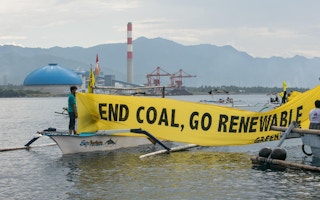Singapore’s OCBC Bank is the first banking giant in Southeast Asia to rule out financing new coal-fired power plants.
To continue reading, subscribe to Eco‑Business.
There's something for everyone. We offer a range of subscription plans.
- Access our stories and receive our Insights Weekly newsletter with the free EB Member plan.
- Unlock unlimited access to our content and archive with EB Circle.
- Publish your content with EB Premium.
In an interview with Bloomberg on Wednesday, the bank’s chief executive Samuel Tsien said the company would no longer fund new coal-fired power plants in any country.
“We hope that by doing this, we are encouraging the governments to do facilitating, arrangements for the countries to move from coal to renewable [energy],” said Tsien.
OCBC is currently involved in funding two coal power plants in Vietnam, but these projects will be the last that the bank will finance due to contract obligations, Tsien said.
Two days after the news of OCBC’s decision broke, rival DBS announced that it would also stop funding new coal power.
In a statement released on Thursday, DBS said that after taking into consideration reports such as the Intergovernmental Panel on Climate Change (IPCC) study released in November, a stark warning of the urgent need to reduce greenhouse gas emissions, it would “cease financing new coal-fired power plant in any market regardless of the efficiency of technologies used, after honouring our existing commitments.”
The last of DBS’ commitments to coal power plants is likely to be completed by 2021.
The news is a major shift in policy for DBS, which released a new climate policy in February last year—the first in Asia—and restricted coal lending, but only in developed markets where the company barely has a presence.
OCBC and DBS join a growing list of finance institutions around the world retreating from coal as concern grows over the role the fossil fuel plays in exacerbating climate change. Burning coal is the single biggest contributor to man-made greenhouse gas emissions.
OCBC decided on its new financing strategy this quarter, said Mr Tsien, who added that OCBC has not engaged in discussions on coal-fired power plants over the last two years.
Meanwhile, OCBC is boosting efforts to fund renewable energy projects, an area the bank sees as a profitable business, Mr Tsien said. It is currently funding over 20 solar farms in Malaysia, as well as wind projects in Australia and Taiwan, Bloomberg reported.
So too is DBS. The bank said that in 2018, it was involved in 17 renewable energy financing deals with an estimated loan size of more than S$1.3 billion.
Restrictions on coal lending introduced by over 100 financial institutions and coal phase-out plans in 31 countries have helped bring about a 20 per cent drop in newly completed coal plants in 2018, a report from NGOs revealed in March.
Responsible finance has been on the rise in Southeast Asia but until now, no regional bank has been bold enough to declare a complete halt to financing coal - a move that many international banks such as Standard Chartered, Societe Generale and Deutsche Bank, have adopted in recent years.
A game-changing week for energy in Southeast Asia
Julien Vincent, executive director of green group Market Forces, which campaigns for banks to switch to clean energy, commented: “OCBC’s decision to end finance to new coal power plants is an important step forward, bringing the bank into line with its international counterparts that recognise we can no longer afford to expand the coal industry if we are serious about dealing with climate change.”
Following DBS’ decision to also stop financing new coal, Vincent said that this week has been a “major game-changer” for energy finance in Southeast Asia.
“The commitments by DBS and OCBC to stop financing new coal power stations are not only in line with what the science says is needed to avoid catastrophic climate change, but also sends a massive signal to the financial markets that coal is officially out of fashion.”
He said that attention would turn to other major energy lenders in Southeast Asia, such as the Japanese megabanks—namely MUFG, SMBC and Mizuho—to see if they will update their own policies to rule out all new coal.
Vincent also noted that the bank’s decision to continue to provide financing for some coal power projects was “very concerning.”
“The only tarnish on the OCBC and DBS policies stems from the fact that they remain as part of syndicates to several proposed coal power plants: Van Phong 1 and Vung Ang 2 in Vietnam and, for DBS, the Java 9 and 10 coal power plant in Indonesia.”
“All of these projects would bring us a step closer to catastrophic climate change and carry other social and environmental risks,” he said.

















